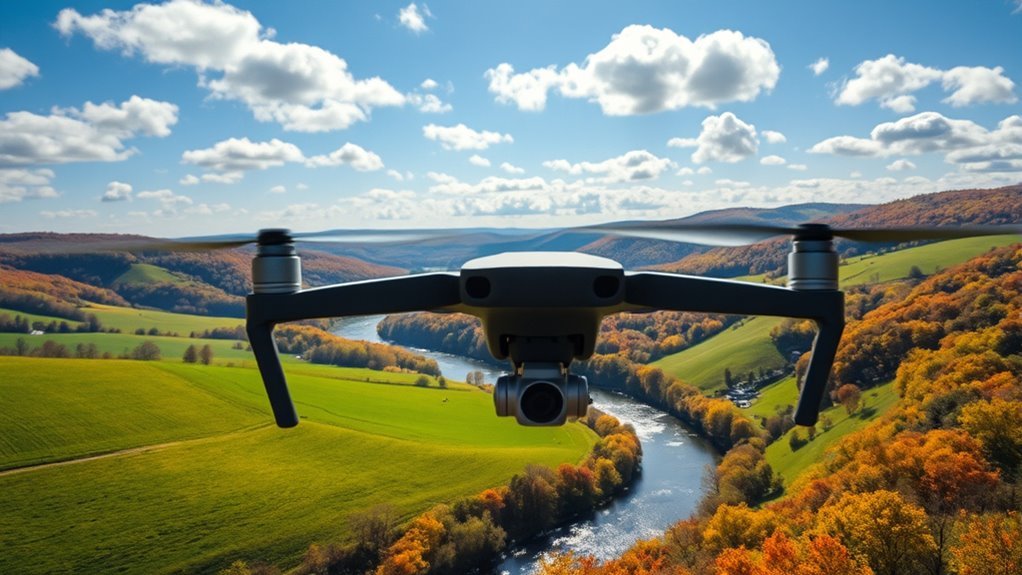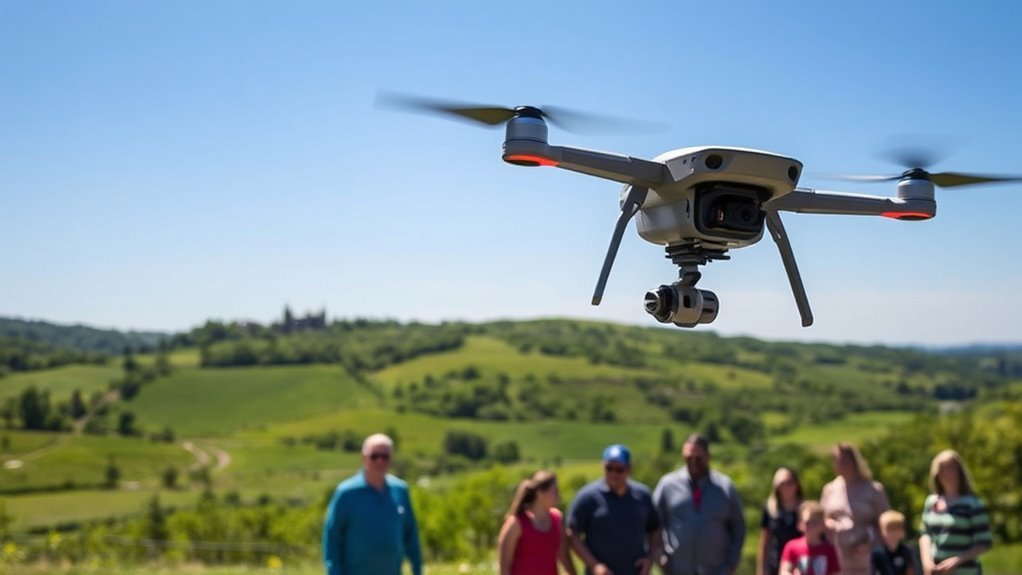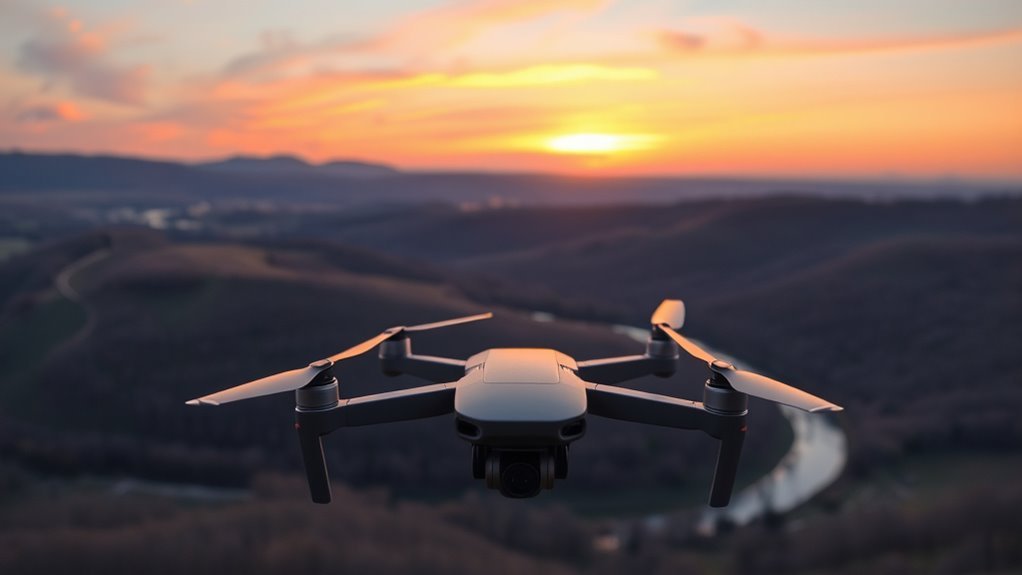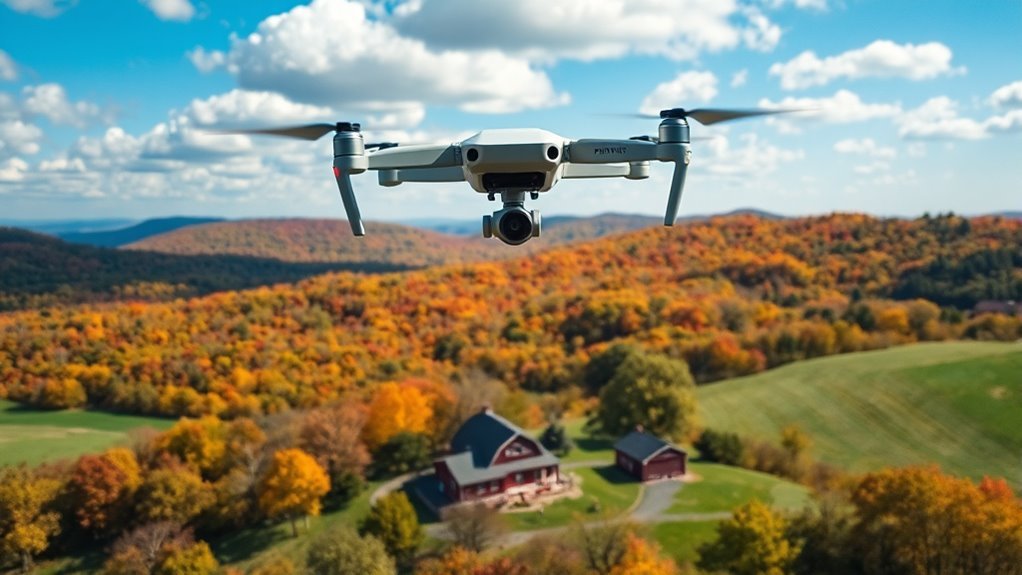Yes, drones are legal in Pennsylvania, but you must follow both state and federal regulations. You’ll need to maintain visual line-of-sight while flying, keep your drone below 400 feet, and avoid restricted areas like airports. Privacy laws prohibit capturing images without consent, especially when surveilling private property. To operate legally, make sure your drone is registered and, if required, that you have the necessary pilot certification. There’s much more to know about safe and responsible drone use.
Overview of Drone Regulations in Pennsylvania

As drone technology continues to evolve, understanding the regulations governing their use in Pennsylvania becomes essential for operators. In this state, drone safety is paramount, and operators must adhere to specific guidelines to guarantee responsible usage. This includes maintaining visual line-of-sight with their drones, not exceeding altitudes of 400 feet, and avoiding restricted airspaces like airports. Additionally, privacy concerns are significant; you need to respect individuals’ rights and avoid capturing images or data without consent. Familiarizing yourself with local laws regarding drone use will not only help you operate within legal boundaries but also foster trust within the community. Staying informed about these regulations empowers you to enjoy the freedoms associated with drone operation while being a responsible user.
Federal Drone Laws and How They Apply

While Pennsylvania has its own set of regulations for drone use, federal laws also play an essential role in governing operations across the state. The Federal Aviation Administration (FAA) establishes federal regulations that set standards for safe drone operation, including pilot certification and airspace restrictions. These rules guarantee that drone enthusiasts can enjoy their freedom without compromising public safety. Additionally, the FAA is responsible for drone enforcement, monitoring compliance, and issuing penalties for violations. Understanding these federal regulations is imperative for anyone looking to operate a drone legally in Pennsylvania. By adhering to both state and federal guidelines, you’ll not only protect your rights but also contribute to the responsible use of drones in your community.
Pennsylvania State-Specific Drone Rules

Though federal regulations provide a foundational framework for drone operations, Pennsylvania has implemented specific state laws that drone operators must know. In PA, drone users must respect drone privacy rights, meaning you can’t invade someone’s personal space or capture images without consent. If you’re interested in aerial photography, be mindful of the locations you choose; flying over private property can raise legal issues. Additionally, PA law restricts drone use for surveillance purposes without proper warrants. Operators must also adhere to flying below 400 feet and maintaining a visual line of sight. Understanding these specific state rules is essential for anyone looking to enjoy the freedom and creativity that drone flying offers while remaining compliant with local laws. Furthermore, being aware of drone surveillance ethics is crucial to ensure respectful and lawful use of drone technology in Pennsylvania.
Restrictions on Drone Use in Specific Areas
Understanding the restrictions on drone use in specific areas is vital for compliance and safety. In Pennsylvania, you’ll encounter no fly zones, which are typically near airports, military bases, and other sensitive locations. Flying a drone in these areas can lead to serious legal repercussions. Urban regulations also play an important role; many municipalities have enacted rules that limit drone operations in densely populated regions to guarantee public safety and privacy. Before taking off, familiarize yourself with local laws, as they can vary considerably. Adhering to these restrictions not only protects you from fines but also promotes responsible drone use, maintaining the freedom to enjoy this technology without infringing on others’ rights. Moreover, understanding FAA regulations is crucial for ensuring that your drone flights comply with safety standards and operational limits.
Obtaining a Drone License and Registration in PA
Before you take to the skies with your drone in Pennsylvania, it’s important to navigate the process of obtaining the necessary licenses and registration. First, you must complete the drone registration process through the Federal Aviation Administration (FAA) website. This involves providing your information and paying a small fee. Once registered, your drone will receive a unique identification number, which must be displayed on the aircraft.
Next, to operate your drone commercially or if it weighs over 0.55 pounds, you’ll need to pursue drone pilot certification. This requires passing the FAA’s Aeronautical Knowledge Test, demonstrating your understanding of airspace regulations, weather, and drone operation. Completing these steps guarantees you’re flying legally and responsibly, enhancing your freedom in the skies.
Frequently Asked Questions
Can I Fly a Drone at Night in Pennsylvania?
You can fly a drone at night in Pennsylvania, but you must follow specific drone regulations. Make certain your drone has proper lighting and that you’re aware of any local restrictions to maintain safety and compliance.
Are There Weight Limits for Drones in PA?
When it comes to drone regulations, think of weight restrictions as a safety net. In Pennsylvania, drones over 55 pounds require FAA registration. Staying informed helps you navigate the skies responsibly while enjoying your freedom.
Do I Need Insurance to Fly a Drone in PA?
You don’t legally need insurance to fly a drone in PA, but it’s wise. Drone registration’s necessary, and many insurance providers offer policies covering liability and damage, ensuring you’re protected while enjoying your freedom in the skies.
Can I Use a Drone for Commercial Purposes in PA?
You can use a drone for commercial purposes in PA, but you’ll need to adhere to drone regulations and obtain commercial licensing. Ensuring compliance allows you to fully enjoy the freedom this technology offers.
What Should I Do if My Drone Crashes?
If your drone crashes, first assess the damage for crash recovery. Check for broken parts and perform routine drone maintenance. Document the incident for insurance, and consider reviewing flight logs to improve future safety measures.

